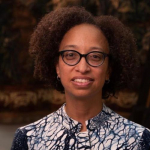This cluster investigates how data and archives are used to tell stories about the past and imagine more just alternatives for the future. With particular attention to race, gender, class, and climate the cluster addresses the problem of how methods and sources can distort research about enslaved, colonized, and incarcerated populations. Missing records and skewed data collection pose an ethical challenge in multiple fields, and spur innovative research methods. We will consider how history, literary studies, creative arts, quantitative social sciences, and environmental studies each employ different forms of evidence, both to understand the past and to demonstrate in the present how attending to marginalized stories refine visions and strategies for building a more just community.
The educational goals of this cluster are: to become familiar with content in economics, history, literature, and gender and sexuality studies; develop skills in gathering and presenting data to build persuasive narratives, employ research methodologies appropriate to various forms of data and primary sources, and to develop critical and creative writing skills.

Tsitsi Jaji, Helen S. Bevington Associate Professor, English and African & African American Studies
This course examines how Black writers and other artists approach archives, historical documents, and data to seed new works in dialog with the past. The idea of a historical record poses a particular problem for African and Afro-descended peoples whose histories have been omitted, erased, and distorted by racist ideologies. This dilemma has proven fruitful for imagining alternative formats and uses of “the archive” conceived broadly. In the course we will study works that use databases of fugitive slave ads, oral histories, colonial photographs, the landscape, and even the very absence of documents as instigation for poetry, music, and visual arts. Assignments in this course will include critical writing and creative projects. Our studies will be enriched by visits to the Nasher Museum of Art, Rubenstein Special Collections, and artist visits.

Saskia Cornes, Assistant Professor of the Practice of the John Hope Franklin Humanities Institute and Program Director, Duke Farm
Many archives of the past - particularly the histories of those who were not considered to be subjects in their own right, such as women or the enslaved – cannot be found in rare book collections or libraries. Using literature and experiential learning with the Duke Campus Farm, this course aims to read plants, landscapes, embodiment, foodways, and soil as archives, points of data, and texts for interpretation.

Felwine Sarr, Anne-Marie Bryan Distinguished Professor of French and Francophone Studies
The objective of the course is to analyze the social, political, and cultural dynamics of post-independence African states through the musical archive. The course will analyze the role that music has played in the construction of national identities in post-colonial African states, but also in the social, political, and cultural dynamics of contemporary Africa.
From High-life in Ghana to Congolese rumba, Afrobeat in Nigeria, reggae, Hip Hop and Raï, in Côte d'Ivoire, Senegal, and the Maghreb, it will show how music has accompanied the social, political, and cultural evolution of African nations. In sub-Saharan Africa, it has been a major arena for political expression, particularly that of post-independence disillusionment and democratic aspirations.
The course also involves thinking of music as a space of knowledge and as a landscape by analyzing the space of musical circulation, particularly between Africa, Latin America, and the Caribbean, as well as the formation of a transnational and transatlantic space for the constitution of African societal modernities.